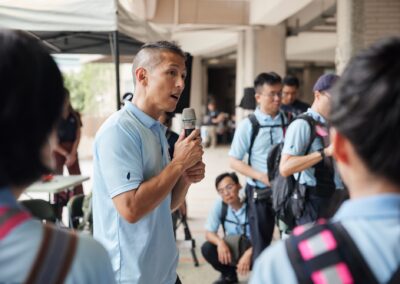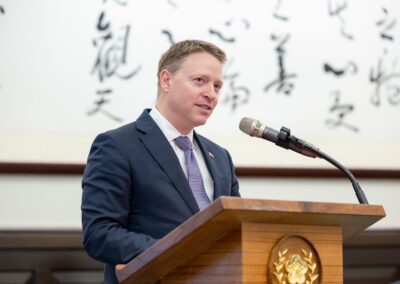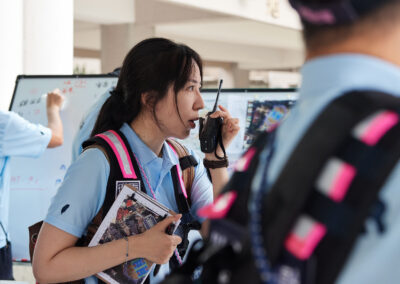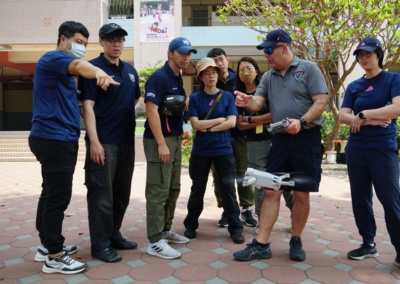In Rural Tajikistan, SoA is Advancing Stability and Education
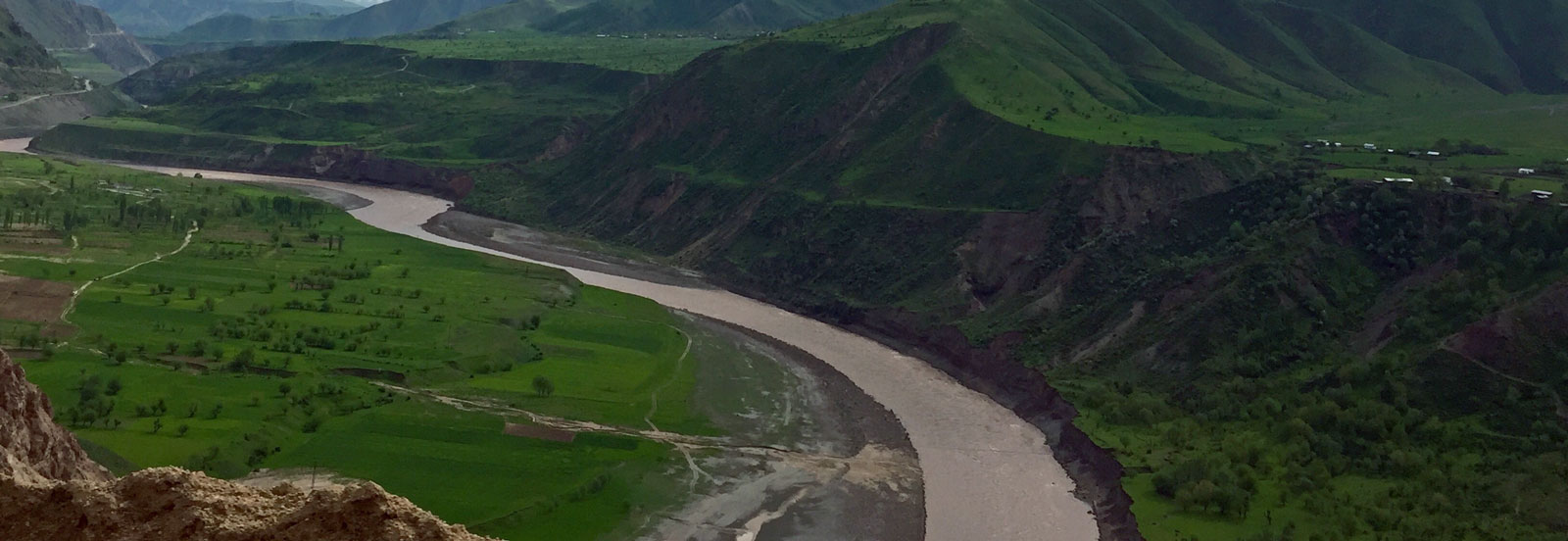
The drive out of Dushanbe started with little fanfare, as our two-vehicle convoy navigated the unruly city traffic. Quickly, the humdrum of Tajikistan’s capital, a hodgepodge of tree-lined avenues, Soviet-style apartment blocks (known as Khrushchyovka), and larger-than-life monuments that leave little room to the imagination, gave way to a soothing tapestry of secluded mountains, lush valleys, and meandering waterways.
We wound our way east on Highway 41 towards the Rasht Valley, a massive watershed drained by the fast-flowing Vaksh River. Jagged snow-capped peaks shimmered off in the distance. Our destination was Gharm, the region’s administrative hub. Our plan was to meet with Kanoatsho Loikzada, the Gharm District Chairman, and his deputies, then tour a new U.S government-built school that SoA furnished with 120 student desks.
The project’s genesis was in 2013, well before SoA was involved. At the time, the U.S. Army civil affairs team in the Central Asian States reached out to the marginalized districts in the Rasht Valley. Set along the northern border with Kyrgyzstan, the inhabitants of the impoverished have long felt disconnected from the central government in Dushanbe, leaving an opening for external influences and extremism to creep in. Both the Tajik and U.S. governments shared a strong interest in maintaining stability and social cohesion in the ethnically mixed valley.
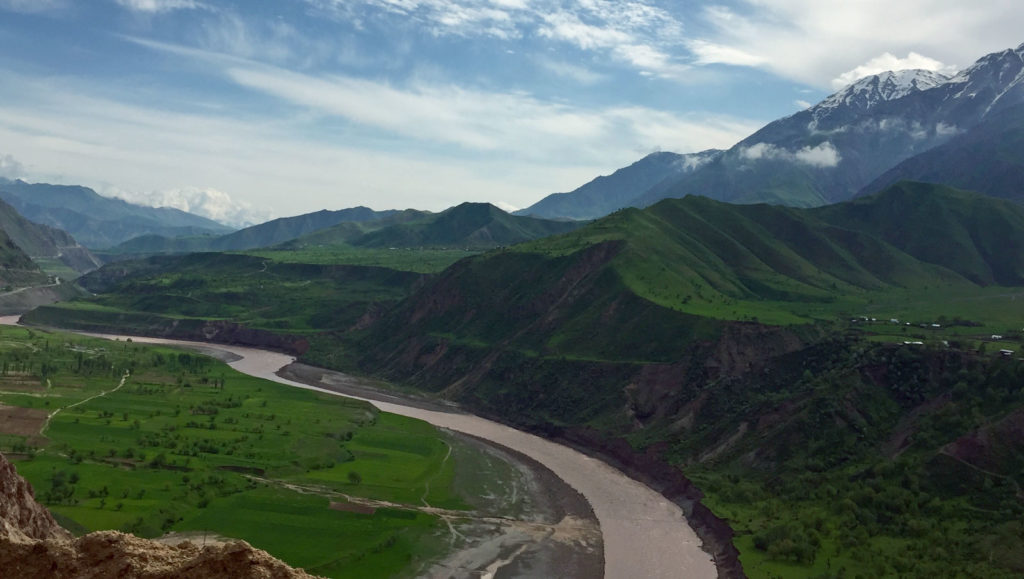
The Vaksh River snaking its way through the lush Rasht Valley
After consultations with the Minister of Education, the U.S. team agreed to fund the building of a public school to bolster the community’s resilience and strengthen continued partnership with the U.S. The local government would furnish it. Unfortunately, a harsh winter and a series of mudslides understandably left the district unable to foot the bill for school furnishings.
In late February, the civil affairs team reached out to SoA to help get the school initiative past the finish line. The one item for which funding could not be secured were desks for the students, a simple need but one for which there were no resources. Over the next few weeks, we worked closely together, at times communicating on a daily basis as we worked out logistics and fine-tuned project details.
Down a narrow road that clung to the side of the steep mountain, our vehicles descended towards the valley floor. Three hours out of Dushanbe, and seemingly another world away, we arrived in Gharm, a one-road town hugged by epic landscapes that made the place seem minuscule. We headed directly to the municipal building. After a brief protocol stop with the deputy district chairman, we were ushered into Chairman Loikzada’s office.
Following warm greetings and hugs, we settled around the rectangular conference table as the Chairman quickly got down to business, an uncommon quality in the region. To start, he thanked the Army team for their support to his district before discussing the challenging winter season and the mudslides that have wreaked havoc on his annual budget. He then expressed his regret that the municipality could not provide desks and furniture for the school.
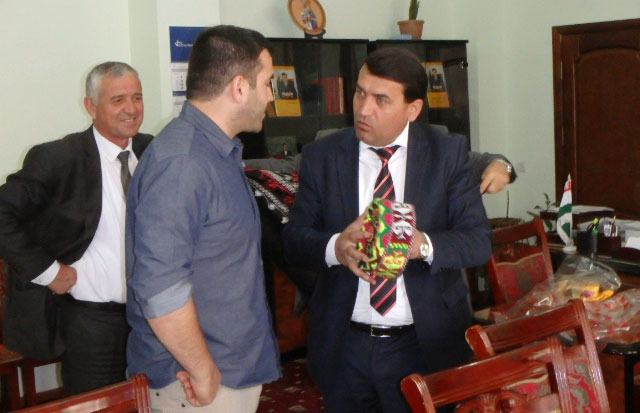
Gharm District Chairman, Kanoatsho Loikzada, giving SoA Middle East Field Operations Project Manager, Zack Bazzi, a traditional Tajik hat known as Tubeteika
Mr. Loikzada then turned to me: “Thank you to Spirit of America for providing the desks and for helping our school from so far away.”
The Army team wrapped up the meeting with questions regarding the overall situation in the valley, school opening date, the mudslides, and a whole host of other topics. They were clearly a well-practiced team, as they played off one another with each member focusing on a particular subject area.
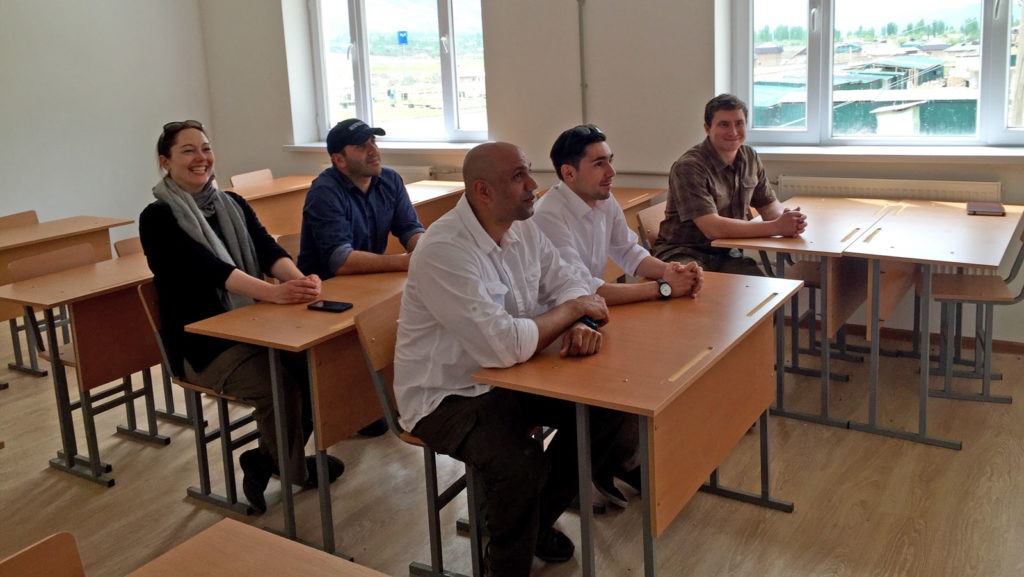
Zack along with two members of the civil affairs team, their interpreter and a U.S. Department of State official trying out the new school desks
Sitting around the table, I could not help but marvel how mundane yet extraordinary the scenario was. We were four soldiers and a civilian SoA representative on the frontlines of American influence where national policies, formulated thousands of miles away, ultimately manifested themselves. Still, we were also just a group of guys having a good chat.
Later in the afternoon we visited the school, currently scheduled for grand opening later this summer. A simple plaque inscribed with “Secondary school No. 100, Garm town, Tajikistan” hung above the entrance. The education superintendent gave our group a tour of the new building, which, after recent rain, seemed to sparkle against the green backdrop of the surrounding slopes. Inside each classroom, polished desks were arranged in neat rows. It was a good scene.
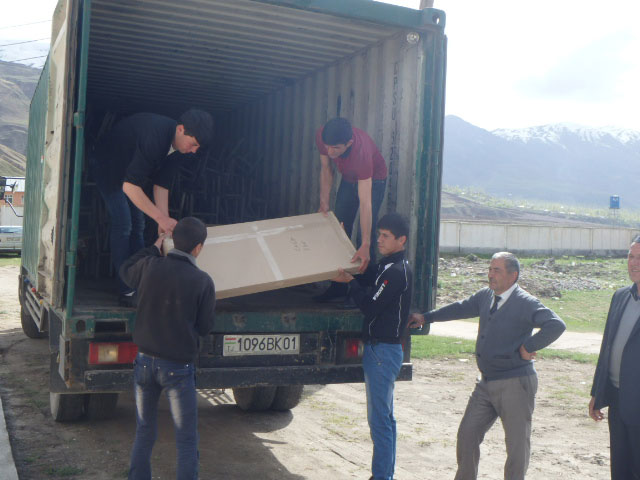
SoA-funded student desks being delivered to the newly built Gharm District school
I travelled thousands of miles to see this school. A few more things have to fall into place before opening day. Still, knowing that for years to come, students in the Rasht Valley region will obtain a quality education, partly because of the support that SoA is now providing, left me feeling content. Beyond the dignity of education, community-based projects like this one—designed from the ground up with and through local stakeholders—give voice to and empower people across the remote stretches of Tajikistan, fostering social stability and combating the encroachment of violent extremism. Stable communities with educated children are not just a good thing for our friends in Tajikistan, but for America as well.
Because of our generous supporters, we made an impact on the mission of our troops and the education of children half a world away. Thank you.
Zack Bazzi
Project Manager – Middle East


